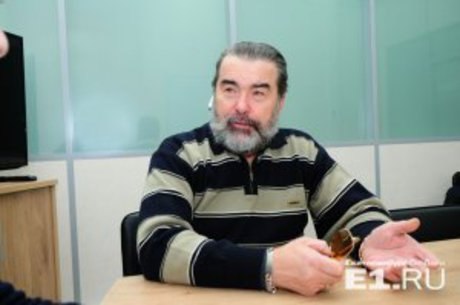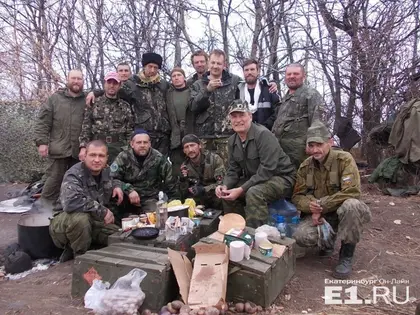Residents of Sverdlovsk go to war in Ukraine and die in combat. In August, a contract soldier from Novouralsk, Aleksei Zasov, died in the south-east of Ukraine. The president recently awarded him the Order of Courage posthumously. On Oct. 15, two men from the Urals, Vasiliy Zhukov from the village of Belokamenny, and 37-year-old native of the village Novoutkinsk Gennady Korolev died after a hit from a Ukrainian tank. Another participant of that fight, wedding photographer Mikhail Laptev, lost a leg.
On Oct. 30, former Yekaterinburg policeman Pavel Bulanov was shot close to the Donetsk airport. For nearly 1,5 months his relatives could not pick up his body from the Ukrainian territory.On Dec. 14 volunteers from the Urals were awarded in Yekaterinburg, for distinguishing themselves in battles in Ukraine, and came back home alive and well.
JOIN US ON TELEGRAM
Follow our coverage of the war on the @Kyivpost_official.

We found a man who organized the award ceremony. He says that he sends men from Sverdlovsk to the civil war (sic).
He is head of the Sverdlovsk fund of veterans of special forces Vladimir Yefimov.
Ekaterinburg Online: When did you first start to give assistance to send men from the Urals to the war?
Vladimir Yefimov: After the Maidan, even before the joining of Crimea (with Russia). Veterans called me themselves, and said “Dmitrich, what’s happening there? Let’s go bring order!” I took time off to weigh everything, but they could not resist and went at their own risk. There is a saying if you can’t prevent chaos, you need to lead it. After that I started preparing the first group to Crimea. The first team were from Khanty-Mansiysk, special forces veterans, cossacks.
They themselves prepared a GAZ-66, three jeeps with inflated tires and equipped themselves disgustingly well. They did everything at their own cost. They took me and we went. I have many relatives and friends in Crimea.
When we got to Kerch, I organized everything, handed them over to responsible guys, who ties them to a base, and they became the “polite people.” (A common reference to armed military men in Russian uniforms, but without insignias).
When Crimea became Russia, they got back. They got huge satisfaction. Some went to get adrenalin, others – to not be bored. From then on, I seriously got engaged in sending volunteers to Ukraine, including Luhansk and Donetsk.
EO: How are volunteers selected?
VY: People come to the fund, and write an application to me: “I am asking for support to send me to assist the fighting people of Novorossiya.” Along with the application, the man fills out a form who he is, where he served, what sort of combat experience he has. If he is a fund member, we already have this information in our database. After the application is considered, we interview him. If the man suits us with his fighting qualifies, I include him in a group to be sent out. All of these men receive a “volunteer ticket.” It’s a formal paper from the fund to make sure we don’t get accused of sending out mercenaries.

EO: Who goes to Ukraine?
VY: All kinds of people. Guys from 35 to 55 years old – the most kick-ass age. There are younger people also. From June, I have sent off six groups of 15-30 people to Donetsk and two groups of 30 people to Lunahsk. There are well-off people who can buy their own equipment. Some were pretty useless. Some never served in the army. Some were even like this: “Take me, I am a drug addict, I will get off the needle there in a state of stress.”
It’s not just me who sends them off. Afghan and Chechen (veteran) organizations also do it. We do not open up number to each other.
EO: Can acting servicemen, emergency ministry workers and policemen go during vacation?
VY: The Russian legislation does not forbid it. If there is a direct prohibition from the unit- then they can’t. If there isn’t, they can go. There is a great hunger for professionals out there. But as you can understand yourself, the state has everything thought through. If anyone gets in trouble there, they will be “fired” long before the date, and they might even have write a dismissal report ahead of time (ahead of the trip).
EO: Do you separate the professionals from those who are no use?
VY: I separate flies and cutlets right away. Special and elite forces go to Donetsk. Cossacks and newcomers without combat experience go to Luhansk.
EO: How much does it cost to equip one volunteer?
VY: On average, an equipped fighter and salary, which I assume they will get in the future, costs about 350,000 rubles (about $6,700). This is a price for a special force trooper. A flak jacket alone costs 70,000 rubles. Night vision goggles are $1,500. Then there are winter clothes, footwear, food and medication. This estimate is even cheap.
EO: What would the salary be out of this sum?
VY: There are now informal norms for salaries. As Pyatigorsk cossacks told me, the payment is 60-90,000 rubles per month ($1,100-1,700) for privates, 120-150,000 ($2,200-$3,000) for more senior ranks. Now they say salaries have grown to 240,000 ($4,500).
EO: Why pay them a salary? You said they were all volunteers.
VY: I think that people need to be paid. They do risk their lives. By paying salaries you can involve professionals in war. They come back with eyes lit up. They did a good job, and they’re not hurting (for money).
EO: Who is paying for this?
VY: We get help in everything except salaries from volunteers and civilians. They find money and pack KAMAZ trucks with humanitarian aid, they find those who are willing to help equip the fighters.
We have no official account to help volunteers. This is why we work like this: we bring a bill to sponsors and after the payment we get power of attorney to get the goods.

EO: Is this how you buy weapons also?
VY: No, we don’t buy them weapons. How can you do it here? This is responsibility of the receiving side. You arrive, you sign, and you get it. When you travel back – you return it.
They’re strict about it.
EO: Is our state helping there?
VY: So far it isn’t. In June I wrote a letter to the president’s envoy in the Urals federal district Igor Kholmanskikh, where I clearly laid out the need to create a civil organization to support volunteer movement in Donbas officially. This would allow to open a bank account which businessmen could fill through transfers. Not to wage war, but for humanitarian assistance. The law is like a lamp post – you can’t step over it, but you can go around it. The organization would officially select candidates for humanitarian service.
EO: What was the response from the envoy’s office?
VY: At the present moment consideration of such an initiative is not possible. Thank you for your patriotic impulse!
EO: How do volunteers get to the place of service?
VY: First time they went under pretense of being the Red Cross. They received papers from the local department that we’re the convoy. Now we also load the guys into trucks with humanitarian aid and send them off. On average, they go for a month. Some of them go while they’re on vacation, possibly to make money. I ask them not to tell me how much they make – it does not concern me.
EO: After that you have no responsibility for their destiny?
VY: We have no money to return the body to Russia or help relatives. I immediately warn all volunteers about it. They have no illusions. But we help when we can.
EO: How many Russian volunteers have died in Donbas, including those from the Urals? Do you have such information?
VY: I don’t, and I don’t think anyone does. The work to send off volunteers is not centrally coordinated, there is no joint sending-off point, and so there is no statistics or understanding of the scale.
EO: Do you consider it necessary to investigate the killing of each volunteer? To find out the cause of death?
VY: By all means there needs to be a probe. Commander of a normal unit fills out a registry of fights, which includes intelligence information, all fights, plans and data on irreparable losses. But you have to understand that in the conditions of war it’s not always possible to establish the exact causes.
EO: Can relatives of those killed have access to this data? Find out how and where their relatives died?
VY: We tell them what happened.

EO: Why do volunteers continue to go there?
VY: Our press and TV give egregious facts. Russian people cannot stand the terror that fascists had started there. Murdered women, children and elderly. Most of those who go, they sympathize, empathize and want to help. This is especially true about people of 40-60 years of age who were brought up in Soviet tradition. My bloods starts to boil when they showed a woman torn to pieces, with a child. What are those scums doing? These moods were especially spurred in Odesa, where a lot of people burned down alive. Some are going for adrenalin. Especially those who had been at war before, and are drawn back.
EO: Currently it’s relatively calm in Ukraine. Are new groups of volunteers being prepared?
VY: Lately Russian volunteers have been squeezed out of Novorossiya under various excuses. Commanders calls the guys who are already there and say: “Go home, you’re not needed here.” This is why I am not preparing new groups at the moment – they’re not needed. But we do have reserves.
EO: Aren’t you worried that that it will be like in Kazakhstan, where volunteers are now on trial who had also been fighting in Donbas? That you will get charged, for example for recruiting mercenaries?
VY: I have nothing to worry about for myself and those volunteers who went to war with my papers. If they find any sort of order we work to, let them sue. But you cannot prove what does not exist in nature. People go there as volunteers.

You can also highlight the text and press Ctrl + Enter




